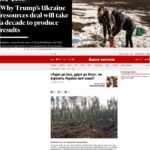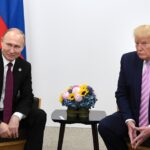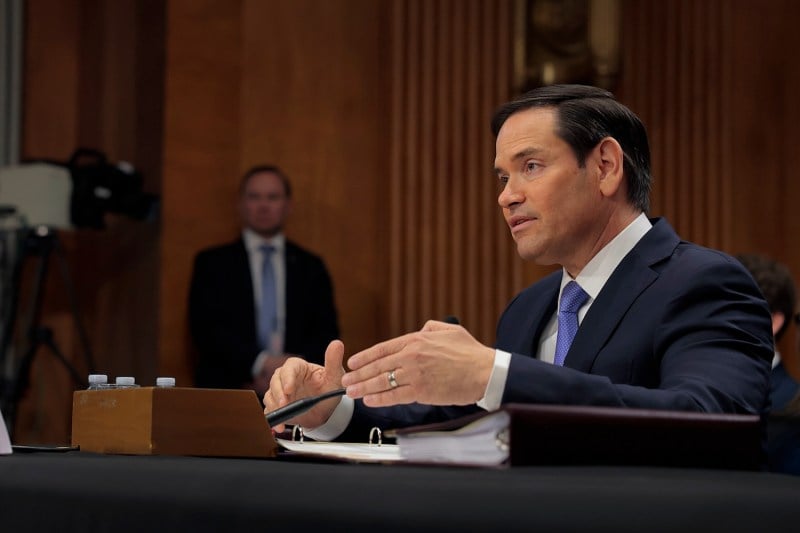U.S. Partners Retaliate Against Trump’s Reciprocal Tariffs

U.S. Partners Retaliate Against Trump’s Reciprocal Tariffs
The White House hopes to boost domestic manufacturing, but global markets fear rising prices and high inflation.
U.S. President Donald Trump speaks during a “Make America Wealthy Again” trade announcement event at the White House in Washington on April 2. Andrew Harnik/Getty Images
Welcome back to World Brief, where we’re looking at retaliatory measures against U.S. reciprocal tariffs, Israel expanding operations in Gaza, and a temporary cease-fire in Myanmar’s civil war.
U.S. Faces Tariff Retribution
U.S. President Donald Trump imposed sweeping “reciprocal” tariffs on virtually all of Washington’s allies and adversaries on Wednesday. Will it be Liberation Day, as Trump calls it, or Recession Day? Only time will tell, but U.S. trading partners are not optimistic.
Welcome back to World Brief, where we’re looking at retaliatory measures against U.S. reciprocal tariffs, Israel expanding operations in Gaza, and a temporary cease-fire in Myanmar’s civil war.
U.S. Faces Tariff Retribution
U.S. President Donald Trump imposed sweeping “reciprocal” tariffs on virtually all of Washington’s allies and adversaries on Wednesday. Will it be Liberation Day, as Trump calls it, or Recession Day? Only time will tell, but U.S. trading partners are not optimistic.
“For decades, our country has been looted, pillaged, raped, and plundered by nations near and far, both friend and foe alike,” Trump said at the White House. “Today, we’re standing up for the American worker, and we are finally putting America first.”
Several major U.S. trading partners have pledged hefty retaliatory measures in response, suggesting that the White House’s trade war is just beginning. “Europe has not started this confrontation,” European Commission President Ursula von der Leyen said on Tuesday. “We do not necessarily want to retaliate but, if it is necessary, we have a strong plan to retaliate, and we will use it.”
Canada has vowed counter-tariffs, while Senate Democrats moved to pass a resolution aimed at blocking U.S. duties on Canadian products. Mexican President Claudia Sheinbaum said on Wednesday that she does not plan to impose tit-for-tat tariffs on the United States but will unveil a broad economic plan on Thursday, when impending U.S. auto duties go into effect.
And China, South Korea, and Japan agreed this week to respond to U.S. levies in a rare moment of Indo-Pacific unity, though Seoul and Tokyo have pushed back against the characterization that this is a joint move.
Reciprocal tariffs will go into effect at midnight and will act as a “declaration of economic independence,” Trump said, with the United States imposing duties on those countries that tax Washington. Rates will vary per nation, and an additional 10 percent baseline tariff will be applied to all countries regardless. The move, first announced in February, marks the most severe set of U.S. duties since the 1930s, which notably worsened the Great Depression.
Trump hopes that these measures will encourage U.S. and foreign companies to move their operations to the United States and create more factory jobs. According to White House trade advisor Peter Navarro, the new tariffs could raise $600 billion a year, which experts say could be the United States’ largest tax increase on a percentage basis since World War II.
However, economists fear that such actions will raise costs for consumers—both in the United States and abroad—and increase inflation. Global markets have already seesawed in anticipation of an uncertain future.
The U.S. trade war has become central to Trump’s second term. On Feb. 1, Trump announced 25 percent tariffs on Canada and Mexico as well as 20 percent total tariffs on China to push for better border security and drug trafficking measures. These duties were delayed, with the ones on Canada and Mexico not going into effect until March 4. The first round of 10 percent tariffs on China was imposed in February, and the second round followed a month later.
In March, the White House issued 25 percent steel and aluminum duties, and Trump warned of a 200 percent tariff on European alcohol as well as 25 percent secondary tariffs on countries that purchase Venezuelan oil. That is not including other tariff threats that were suspended, delayed, or revoked due to blitz negotiations and global outcry.
Today’s Most Read
- Asia Is Getting Dangerously Unbalanced by Stephen M. Walt
- Are China and Russia on a Collision Course in Africa? by Jessica Moody
- Trump’s Tariffs Stretch Security Exceptions to the Breaking Point by Keith Johnson
What We’re Following
New security corridor in Gaza. Israeli Prime Minister Benjamin Netanyahu announced on Wednesday that Israel plans to establish a new security corridor in Gaza to pressure Hamas into releasing remaining hostages. The planned corridor will likely run between the southern cities of Khan Younis and Rafah. Israeli forces have already issued mass evacuation orders for the latter city.
“We are cutting up the strip, and we are increasing the pressure step by step, so that they will give us our hostages,” Netanyahu said on Wednesday, the same day that he traveled to Hungary for talks with Prime Minister Viktor Orban. Netanyahu’s four-day trip defies an International Criminal Court arrest warrant; Hungary is a member of the Rome Statute but has signaled that it will not arrest him.
Netanyahu’s statement comes just hours after Israeli Defense Minister Israel Katz unveiled plans to seize large areas of Gaza, to be “incorporated into Israel’s security zones.” “Expanding the operation this morning will increase the pressure on the Hamas murderers and also on the population in Gaza and advance the achievement of the sacred and important goal for all of us,” Katz wrote on X on Wednesday.
By specifically mentioning Palestinian residents in his social media post, legal experts warn that Israel could be planning to deliberately target civilians, which would violate international law and could constitute a war crime.
Pause in fighting in Myanmar. Myanmar’s ruling junta declared a temporary cease-fire with the country’s rebel groups on Wednesday, to run until April 22. The surprise truce aims to facilitate the delivery of humanitarian relief following the devastating 7.7 magnitude earthquake that struck the region last Friday. Rebel alliance leaders announced a similar one-month pause in fighting on Tuesday, saying they would only act in self-defense.
Myanmar has been embroiled in a deadly civil war since February 2021, when the country’s military ousted the democratically elected National League for Democracy from power. More than 3 million people have since been displaced from their homes amid fighting between rebel groups and the military, and bouts of ethnic violence have targeted the country’s minority Rohingya population.
Last week’s earthquake further exacerbated Myanmar’s humanitarian crisis, with the death toll on Wednesday surpassing 3,000 people, according to local officials. Several countries have offered aid to Myanmar as well as rapid response personnel.
Military aid for Ukraine. Defense ministers from the European Union’s largest militaries convened in Paris on Wednesday to discuss a new security framework for Ukraine. Representatives from France, Germany, the United Kingdom, Italy, and Poland pledged to continue supporting Ukraine in its war against Russia and emphasized the need for “stronger European capabilities” through increased defense spending and bolstered arms production.
The United Kingdom and France have led efforts to create a “coalition of the willing” that would include a reassurance force in Ukraine to dissuade Russia from future aggression. “This is a force designed to deter, in order to send that message to [Russian President Vladimir] Putin that this is a deal that is going to be defended,” British Prime Minister Keir Starmer said last week.
According to French Defense Minister Sébastien Lecornu, at least 15 countries have expressed interest in this process. And on Monday, London confirmed that British, French, and Ukrainian military leaders will meet in the coming days to discuss security assurances for Kyiv. However, whether such a force involves ground troops or only political and logistical support remains to be seen.
Odds and Ends
Many Dubliners take pride in the city’s iconic Molly Malone statue, which stands on Suffolk Street and symbolizes the eponymous character in the Irish capital’s unofficial anthem. However, there is such a thing as too much love. Dublin City Council confirmed this week that the cart-wielding woman will be placed under protective watch to prevent tourists from groping her, which has led to discoloration of the bronze. Really, guys?
Alexandra Sharp is the World Brief writer at Foreign Policy. X: @AlexandraSSharp
More from Foreign Policy
-

An illustration shows a golden Cybertruck blasting through a U.S. seal of an eagle holding arrows and laurel. Is America a Kleptocracy?
Here’s how life could change for the rich, poor, and everyone in between.
-

The flag of the United States in New York City on Sept. 18, 2019. America Is Listing in a Gathering Storm
Alarms are clanging at the U.S. geographic military commands around the globe.
-

U.S. President Donald Trump shakes hands with Supreme Court Chief Justice John Roberts during Trump’s inauguration in Washington, D.C. The U.S. Judicial Crisis Is Uniquely Dangerous
But other democracies provide a roadmap for courts to prevail over attacks from the executive branch.
-

An illustration shows a golden Newtons cradle with Elon Musk depicted on the one at left and sending a globe-motif ball swinging at right. Elon Musk’s First Principles
The world’s richest man wants to apply the rules of physics to politics. What could go wrong?








Join the Conversation
Commenting on this and other recent articles is just one benefit of a Foreign Policy subscription.
Already a subscriber?
.
Subscribe
Subscribe
View Comments
Join the Conversation
Join the conversation on this and other recent Foreign Policy articles when you subscribe now.
Subscribe
Subscribe
Not your account?
View Comments
Join the Conversation
Please follow our comment guidelines, stay on topic, and be civil, courteous, and respectful of others’ beliefs.
Change your username |
Log out
Change your username:
CANCEL
Confirm your username to get started.
The default username below has been generated using the first name and last initial on your FP subscriber account. Usernames may be updated at any time and must not contain inappropriate or offensive language.